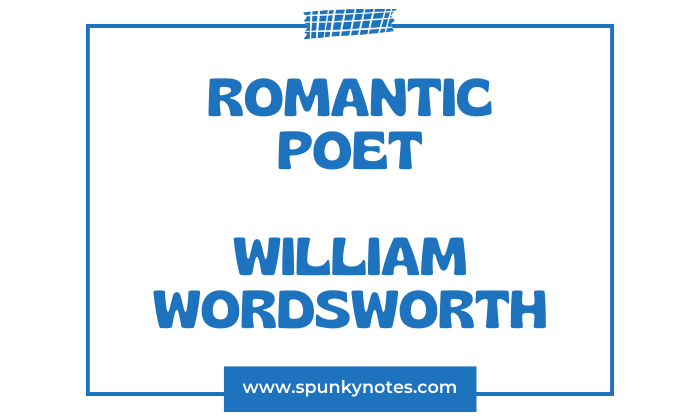
Q. Discuss William Wordsworth as a romantic poet.
The Romantic Movement emerged as a response to the Enlightenment’s emphasis on reason. It advocated the importance of emotion and individual experience in literature. William Wordsworth was a key figure in this movement, championing the beauty of the natural world and its profound impact on the human spirit.
His approach to poetry, detailed in the preface to “Lyrical Ballads,” which he co-authored with Samuel Taylor Coleridge, was groundbreaking. Wordsworth advocated using everyday language and focusing on ordinary subjects to express genuine emotions and thoughts.
William Wordsworth as a Romantic Poet
William Wordsworth is considered a Romantic poet primarily because of the themes and styles that characterize his poetry, which align with the fundamental ideals of the Romantic Movement. Here are some reasons why Wordsworth epitomizes Romantic poetry:
- Love for Nature
- Focus on Emotions
- Individual Experience
- Simplicity
- Innovative Style and Form
- Spiritual Elements
- Rebellion
- Idealization of the Pastoral Life
1- Love for Nature
William Wordsworth’s poetry often showcases a profound appreciation for nature, a central theme in many of his works. This love for the natural world is not just about its beauty but also its role in human emotional and moral education.
In his famous poem “Lines Composed a Few Miles Above Tintern Abbey,” Wordsworth reflects on the serene and uplifting influence of nature, which he revisits after five years:
Nature never did betray
The heart that loved her; ’tis her privilege,
Through all the years of this our life, to lead
From joy to joy…
Wordsworth suggests that nature is a consistent source of joy and nurture. It offers a unique emotional support that remains steady through time. His connection to nature goes beyond simple observation. It is an enduring relationship that offers joy and understanding throughout life.
This theme indicates the Romantic belief that nature holds the power to educate and heal the human spirit, presenting an alternative to the disenchanted modern world.
Wordsworth’s poems appreciate the natural world and its ability to affect human thought and feeling. His poetry expresses a strong connection to nature, portraying it as a guiding force and a constant in life.
2- Focus on Emotions
William Wordsworth’s poetry frequently emphasizes emotion and intuition, prioritizing the feelings and personal responses of the individual. This focus aligns with the Romantic era’s shift away from the rationalism that marked earlier periods.
In “I Wandered Lonely as a Cloud,” Wordsworth describes an encounter with a field of daffodils, which elevates his mood and connects him deeply with his surroundings:
For oft, when on my couch I lie
In vacant or in pensive mood,
They flash upon that inward eye
Which is the bliss of solitude;
And then my heart with pleasure fills,
And dances with the daffodils.
This highlights how the memory of the daffodils impacts the speaker’s emotional state, bringing him joy and a sense of connection even when he is alone. The “inward eye” signifies the mind’s power to recall and re-experience the emotions associated with nature.
Wordsworth’s approach here exemplifies the Romantic belief that emotions are not just reactions but critical components of our understanding and engagement with the world.
His poetry values emotional responses as essential to the human experience, suggesting that they guide and inform our relationship with the environment.
3- Individual Experience
William Wordsworth’s poetry often centers on the individual experience, illustrating how personal feelings and thoughts shape our perceptions of the world. In “The Prelude,” a semi-autobiographical poem, Wordsworth recounts his experiences and their influence on his development as a poet and a person.
He describes a specific incident of stealing a boat and the subsequent feelings of fear and awe:
One summer evening (led by her) I found
A little boat tied to a willow tree
Within a rocky cove, its usual home.
Straight I unloosed her chain, and stepping in
Pushed from the shore. It was an act of stealth
And troubled pleasure…
This passage shows Wordsworth reflecting on his youthful adventure and the intense emotions it stirred, which had a lasting impact on his outlook and poetic imagination. The event is depicted not just as a memory but as a moment of deep emotional learning.
Wordsworth’s focus on such personal experiences and their emotional resonances is a hallmark of his contribution to Romantic poetry. He emphasizes the importance of the subjective in understanding ourselves and the world.
4- Simplicity
William Wordsworth’s poetry often features simple language and themes that reflect the lives of ordinary people. He believed in the beauty and significance of the ordinary person’s everyday life.
In “Lines Written in Early Spring,” Wordsworth reflects on the natural scene around him while connecting these observations to the broader human condition:
To her fair works did Nature link
The human soul that through me ran;
And much it grieved my heart to think
What man has made of man.
Through these lines, Wordsworth connects the simple beauty of nature with the more complex emotions and situations of ordinary people.
He laments the state of humanity while appreciating nature’s simple and peaceful existence, which contrasts with human conflicts and social injustices. His work elevates the commonplace, suggesting its inherent value and beauty.
5- Innovative Style and Form
William Wordsworth’s poetry is known for its innovative style and form, particularly his use of everyday language and themes that speak directly to common experiences. In his preface to “Lyrical Ballads,” which he co-authored with Samuel Taylor Coleridge, Wordsworth states his poetic goal:
The principal object, then, which I proposed to myself in these poems was to make the incidents of common life interesting by tracing in them, truly though not ostentatiously, the primary laws of our nature.
This approach was revolutionary then, breaking away from the ornate and often artificial poetic conventions of the 18th century. Wordsworth’s focus on simple, straightforward language and subjects that ordinary people could relate to was a significant shift that influenced the direction of modern poetry.
6- Spiritual Elements
William Wordsworth’s poetry often incorporates spiritual and mystical elements that suggest a deep connection between the human soul and nature. In “Tintern Abbey,” he articulates this connection:
And I have felt
A presence that disturbs me with the joy
Of elevated thoughts; a sense sublime
Of something far more deeply interfused,
Whose dwelling is the light of setting suns,
And the round ocean and the living air,
And the blue sky, and in the mind of man.
These lines convey the poet’s perception of a profound force within nature that elevates his thoughts and emotions. It illustrates a spiritual experience that is both uplifting and grounding.
Wordsworth sees this force as universal, linking the external world of nature with the internal world of human thought and emotion.
7- Rebellion
William Wordsworth’s rebellion against traditional poetic forms marked a significant turn in literary history. In the preface to “Lyrical Ballads,” Wordsworth outlines his approach:
I have proposed to myself to imitate, and, as far as is possible, to adopt the very language of men and, by fitting to metrical arrangement a selection of the real language of men in a state of vivid sensation, to throw over them a certain coloring of imagination, whereby ordinary things should be presented to the mind in an unusual aspect.
This statement underscores his departure from the ornate style of prior poetry, opting instead for a simpler, more direct language that reflects the actual speech of everyday people.
He aimed to bring poetry closer to the lived experiences of ordinary individuals. He uses straightforward expressions that were previously considered unsuitable for poetic expression. This shift not only democratized poetry but also enriched its emotional depth.
8- Idealization of the Pastoral Life
William Wordsworth’s poetry often idealizes pastoral life, presenting it as a peaceful refuge from the troubles of modern society. In “Michael,” a narrative poem, Wordsworth describes the simple, dignified life of a shepherd and the deep connection he has with his land:
An old man, stout of heart, and strong of limb.
His bodily frame had been from youth to age
Of an unusual strength: his mind was keen,
Intense, and frugal, apt for all affairs.
Through Michael, Wordsworth shows how life in the countryside is peaceful and connected to nature, marked by hard work and clear morals.
This view of rural life shows virtues and stability, things Wordsworth believed were missing in cities. He often portrays country living as better than city living because of its simplicity and purity.
Conclusion
William Wordsworth is a Romantic poet known for his new style. His poetry emphasizes emotions, nature’s beauty, personal experiences, and rural virtues.
He moved away from old poetic forms, using simple language and focusing on ordinary people and their surroundings. His poems express a solid emotional bond with nature, seeing it as a source of moral and spiritual understanding.
His idea that simplicity and nature escape modern life’s challenges has greatly influenced literature. Wordsworth’s work has played a significant role in shaping the Romantic period.

